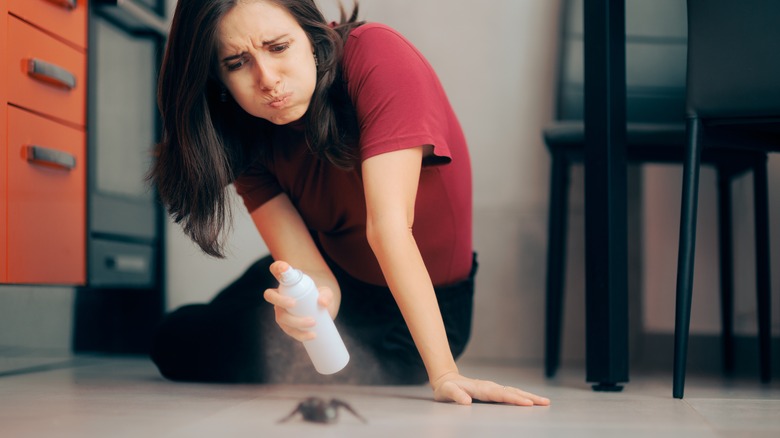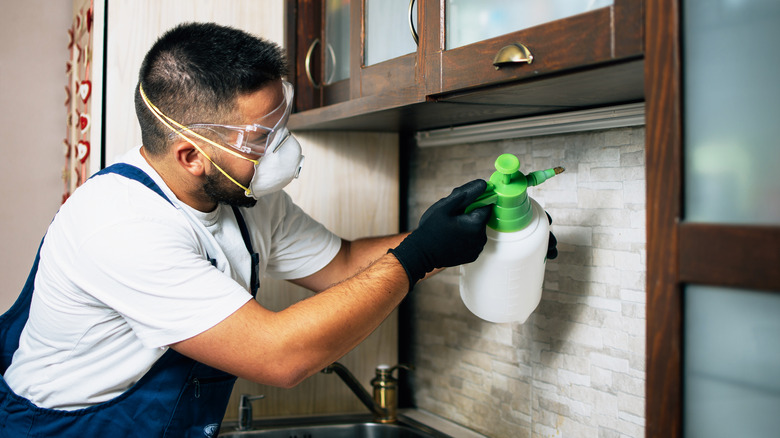Our Conservation Science Expert Weighs In On What To Do If You Find A Dead Animal In Your Home
Nobody wants to find a dead animal in their home, but sometimes it happens when you least expect it. It's important to act fast if you do find a dead animal in order to reduce both unpleasant odors and any risk to you and your home. Speaking exclusively to House Digest, Charles van Rees, PhD, Conservation Scientist and Naturalist for Gulo in Nature, answered all the questions about what to look out for and what to do if you discover an animal has died in your home.
Firstly, the warning signs that a dead animal is in your home. "The most common sign is, unfortunately, smell! The larger the animal, the more likely it will give off an unpleasant odor as it begins to decay. Vertebrates like birds, mammals, lizards and amphibians will generally produce more smell than things like insects," van Rees shared, noting that this decay smell may not be as strong in dry climates. In terms of visuals, van Rees explained what to look out for: "fly larvae (maggots) appearing in unexpected places, or an abundance of carrion flies (as opposed to houseflies). Fluids released from the microbial breakdown of an animal corpse might also cause staining in an area beneath its location, so something in above a room's ceiling might show up that way."
Here's how to get rid of the dead animal once it has been discovered
Now you know what to look for, here's what to do if you have the unfortunate opportunity of finding a dead animal. "Removing a corpse as soon as possible is always the best course of action, even for small ones," Charles van Rees told House Digest. "This might, unfortunately, involve opening up a wall, vent, or other surface to grant access to the corpse." If you don't think you would like to carry out this task yourself, van Rees shared that some wildlife professionals (such as pest control professionals) or contractors are willing to dig into your home and find the animal themselves. Note that you should always be clear and let the person you have hired know that they are dealing with a dead animal so they can bring the right equipment to protect themselves.
Once the animal has been removed, van Rees stated that you might want to figure out how the animal got into the space it died in. "Once you've got a couple of ideas of how that might have happened, you can try and prevent future access so that there isn't a recurrence. This can involve repairing screens, holes in walls, or seals and gaskets for pipes and ducts."
Some animals can carry viruses and diseases dangerous to humans
So, the dead animal has been found, removed, and you know the signs to look out for in case there's a next time. However, what you might not know is that some deceased creatures carry dangerous diseases. As Charles van Rees revealed to House Digest, "On the West Coast, areas frequented by rodents may have dust particles carrying Hantavirus, which is dangerous. Generally speaking, any spaces that are being used by living or dead wildlife in your home should be cleaned and investigated with a mask like an N95 to avoid exposure to any potentially hazardous material."
This applies to both you and anyone you hire to get rid of the animals for you. You should never touch a dead animal with your bare hands or, as van Rees mentioned, breathe in the air surrounding the animal. Gloves and a mask are vital if you are planning to remove the animal yourself. Moreover, after the animal has been removed, you will need to thoroughly sanitize the space. If you're worried, it's best to hire a professional service to ensure all germs and odors are gone.


